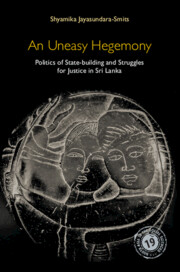Book contents
- Frontmatter
- Dedication
- Contents
- List of Tables and Figure
- Preface
- Acknowledgements
- List of Abbreviations
- 1 Introduction
- 2 Politics of Judgement
- 3 From Nationalism to Ethnic Supremacy
- 4 Political Patronage: Underbelly of Everyday Politics
- 5 State Institutions and Patronage Politics
- 6 War and Peace as Politics by Other Means
- 7 What Came after War?
- Afterword
- Appendix 1 Map of Sri Lanka
- Appendix 2 Indication of Background of Key Interviewees (from January to May 2009)
- Bibliography
- Index
6 - War and Peace as Politics by Other Means
Published online by Cambridge University Press: 29 July 2022
- Frontmatter
- Dedication
- Contents
- List of Tables and Figure
- Preface
- Acknowledgements
- List of Abbreviations
- 1 Introduction
- 2 Politics of Judgement
- 3 From Nationalism to Ethnic Supremacy
- 4 Political Patronage: Underbelly of Everyday Politics
- 5 State Institutions and Patronage Politics
- 6 War and Peace as Politics by Other Means
- 7 What Came after War?
- Afterword
- Appendix 1 Map of Sri Lanka
- Appendix 2 Indication of Background of Key Interviewees (from January to May 2009)
- Bibliography
- Index
Summary
There is a considerable level of attention paid to analyse Sri Lanka's civil war. Especially since the early 1980s, the majority of the academically oriented studies seemed to have drawn inspiration from the works of Federick Barth on ethnicity (cited in Tambiah 1989) and applied them generously to intra-state violent conflicts in this period. These studies have left a lasting and profound impact on the understanding of Sri Lanka's civil war as mainly an ‘ethnic war’ rooted in the antagonistic inter-ethnic relations between the majority Sinhalese and the minority Tamils. Their failure to take critical scholarship produced before the early 1990s on Sri Lanka's civil war into account evaded the opportunity for scrutinising the numerous global and local economic, political and social entanglements that contributed to the war (Jupp 1978; Jayawardena 1984, 1985b; Tambiah 1989; Hennayake 1993; Abeyratne 2004; Bandarage 2009). In spite of the gaps, the notions of inter-ethnic conflict and ethnic war became popular and were even promoted by the Sinhalese ruling political elites and their right-wing forces in the broader Sinhalese society, including some in the Sinhala-Buddhist intelligentsia.
By returning to the global and local literature that applied rich historical-sociological approaches to the study of war, in this chapter I hope to offer a broader interpretation of Sri Lanka's case of war and peace. In this regard, I find the seminal study by Charles Tilly quite helpful to frame Sri Lanka's case of war and peace as it devotes a considerable level of attention to several interlinked variables of war, politics, hegemony-building and state-building. Tilly's main thesis is that ‘state makes war and war makes state and vice versa’ (1985). He famously argued that banditry, piracy, gangland rivalry, policing and war making all belong to the same continuum and are intrinsically linked to the eventual laying out of the capitalist economic foundation of the modern state-building (Tilly 1985: 170). Notably, Tilly drew attention to the use and functions of war as coercive exploitation strategies that fulfilled a crucial role in the modern European state-making processes in the 16th century. As he observed, wars of that time resembled organised crimes that were used by the European state makers and entrepreneurs to consolidate power in the captured territories and to expand the resource-extraction and capital-accumulation process.
- Type
- Chapter
- Information
- An Uneasy HegemonyPolitics of State-building and Struggles for Justice in Sri Lanka, pp. 223 - 274Publisher: Cambridge University PressPrint publication year: 2022

